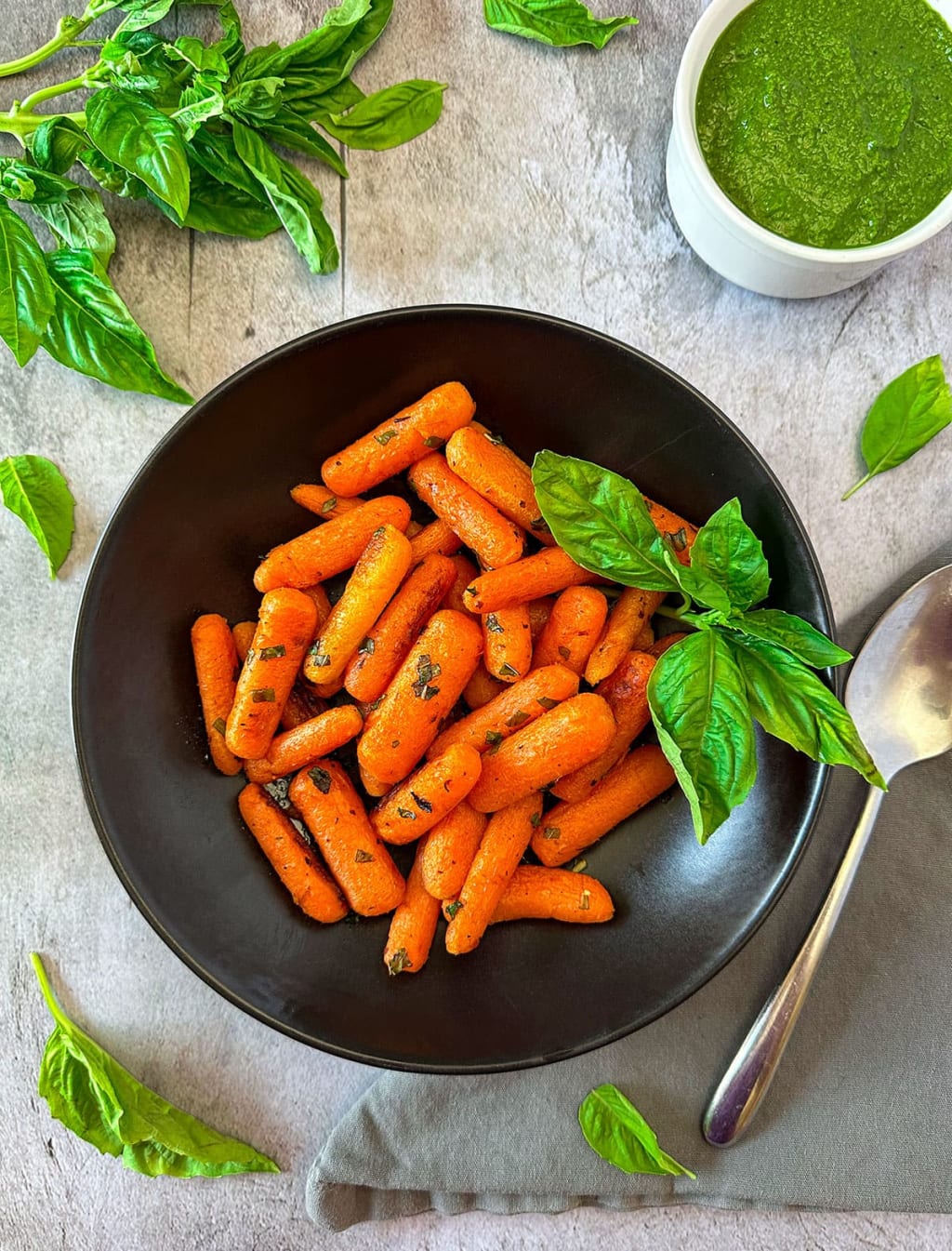Basil Carrots
Here’s a quick and easy recipe for Basil Carrots to brighten up your meal and make you feel like you really accomplished something in the kitchen today.

Since I’ve gotten my hands on some fresh basil, I’ve been looking for different ways to use it. One of the ways I have been using it is in vegetable dishes. I recently made Basil Carrots. Basil Carrots are a super-easy way to make your veggies taste incredible. If you’ve never considered using basil in your carrot recipe, then today is the day you will change your mind!
I don’t know about you, but when I hear the words “carrot” and “basil” together, I imagine something that should be overflowing with flavor. It just sounds like a good mix! Carrots are usually sweet and tangy, while basil is often used to add a touch of freshness or herbaceousness to a dish. And basil is one of my family’s favorite herbs.
Try Basil Carrots if you’re looking for a delicious gluten-free recipe. It’s also great for parties and special occasions like Easter, the 4th of July, Father’s Day, or Mother’s Day. Happy eating!
Yes! Both basil and carrots are highly nutritious and provide various health benefits. Look at their nutritional value:
Carrot’s Nutritional Value!
Carrots are rich in fiber, beta carotene, vitamin C, potassium, vitamin k, and antioxidants. They also offer numerous health benefits.
They’re a low-calorie food that’s been linked to improved cholesterol levels and vision.
Its antioxidants, carotenoids, have been associated with a decreased risk of cancer.
They are beneficial to your heart because carrot’s antioxidants are also advantageous for the heart. Secondly, carrots have potassium, which can aid you to maintain healthy blood pressure. In addition, they contain fiber, which can help you maintain a healthy weight and reduce your risk of cardiovascular disease.
They can help relieve constipation and maintain a regular bowel movement because of their high fiber content.
Vitamin C, found in carrots, aids in the development of antibodies, which strengthen your immune system. Vitamin C also helps with iron absorption and use, as well as infection prevention.
This root vegetable is also loaded with bone-building nutrients like calcium and vitamin K.
Carrots and other non-starchy vegetables are beneficial for diabetics. Carrots are high in fiber, which can aid in blood sugar control. They also contain a lot of beta-carotene, which has been linked to a lower risk of diabetes.
Health Benefits of Basil
Basil is not just a common folk treatment for ailments such as nausea and insect bites, but it is also frequently used in Ayurveda, traditional Chinese medicine, and other alternative medicine systems.
Scientists are now researching the therapeutic properties of basil. Instead of whole leaves, basil extracts or essential oils, which include concentrated concentrations of plant components, are usually tested.
According to preliminary research, sweet basil may:
Reduce the effects of stress and aging on memory.
Reduce depression caused by long-term stress.
Improve your fasting blood sugar, cholesterol, and triglyceride levels.
Lower blood pressure in hypertensive patients.
Reduce the effects of a stroke and aid recovery, whether administered before or immediately after a stroke.
Similar to aspirin, it relaxes blood vessels and thins the blood.
Protect your intestines against the effects of aspirin, which can lead to ulcers.
Provide an antibiotic-free alternative for infectious disorders, particularly the fight against antibiotic-resistant bacterium strains.
Prevent cancers of the breast, colon, and pancreas, among others.
Bacteria that cause tooth decay are inhibited.
Improve food safety, for example, if manufacturers incorporate it into food packaging.
When inhaled as aromatherapy, it boosts mental alertness.
Insects like mosquitos and ticks are repelled.
Many of the disorders listed above have been treated with holy basil in the past. Despite the fact that few human studies are available, the results are encouraging.
When 60 persons with type 2 diabetes received 250 mg of holy basil extract twice a day before breakfast and supper for three months, their average blood sugar dropped by 18% compared to those who merely took the medication.
Furthermore, consuming 1,200 milligrams of holy basil extract every day for six weeks was found to be 39 percent more beneficial than a placebo in a trial of 158 participants with at least three stress symptoms.
How To Make Basil Carrots?
To make this great and healthy side dish or addition to any dinner, all you need is the following simple ingredients and instructions to follow:
Ingredients
Carrots: Carrots are the star of this dish. Try to use fresh ones.
Vegan Butter: Almond butter, sunflower seed butter, or cashew butter can be used alternatively.
Onion powder: Adding onion powder will give it a more savory flavor.
Garlic powder: Garlic powder gives the dish a richer flavor.
Dried basil: Another special and main ingredient of this dish.
Salt: Salt is used to balance out the flavors.
Water
Lemon juice: The lemon juice adds freshness and brightness.
Directions
To make basil carrot, heat vegan butter in a large saucepan, add carrots, onion powder, garlic powder, basil, and salt, and stir. Cook for 1 minute, add water, bring to a simmer, cover the saucepan, and cook for 10 minutes. Add lemon juice and stir; serve immediately.
Serving Suggestions
Serve these simple basil Carrots as a side dish with:
Rice pilau
Vegan Mashed Potatoes
Jackfruit Curry Recipe
Cauliflower Tikka Masala
Teriyaki Soy Curls with Pineapple and Bell Pepper
Vegan Fish and Chips Recipe
Suggestions For Storage
Refrigerate this dish in an airtight container for up to 2 days. Before serving them again, be sure to warm them on the stovetop or in the microwave.
Tips And Notes
Vegetables- Other root vegetables can be used in this recipe; however, the cooking time will most likely differ.
Carrot- Avoid using baby carrots since they lack the flavor of whole carrots.
Peeling– Peeling carrots isn’t required, although it does improve the texture.
Sweetener- Experiment with different sweeteners to change up the flavors.
Herbs- Although I only used dried basil in this recipe, additional herbs such as thyme, rosemary, parsley, and cilantro leaves can be used for a variety of flavors.
Spiciness- Adding paprika and curry powder to your carrots adds the appropriate spicy flavors. For a cheesy twist, add some grated Parmesan cheese.
Cooking time- If you’re using whole or sliced carrots, the cooking time will differ.
Serving- Before serving, a sprinkling of fresh herbs like cilantro, parsley, thyme, or rosemary adds a gorgeous pop of color to this dish!






Comments (1)
Hey, just wanna let you know that this is more suitable to be posted in the Feast community 😊